The Everything Union
A new documentary goes inside the dramatic origins of the Amazon Labor Union — just in time for holiday shopping decisions.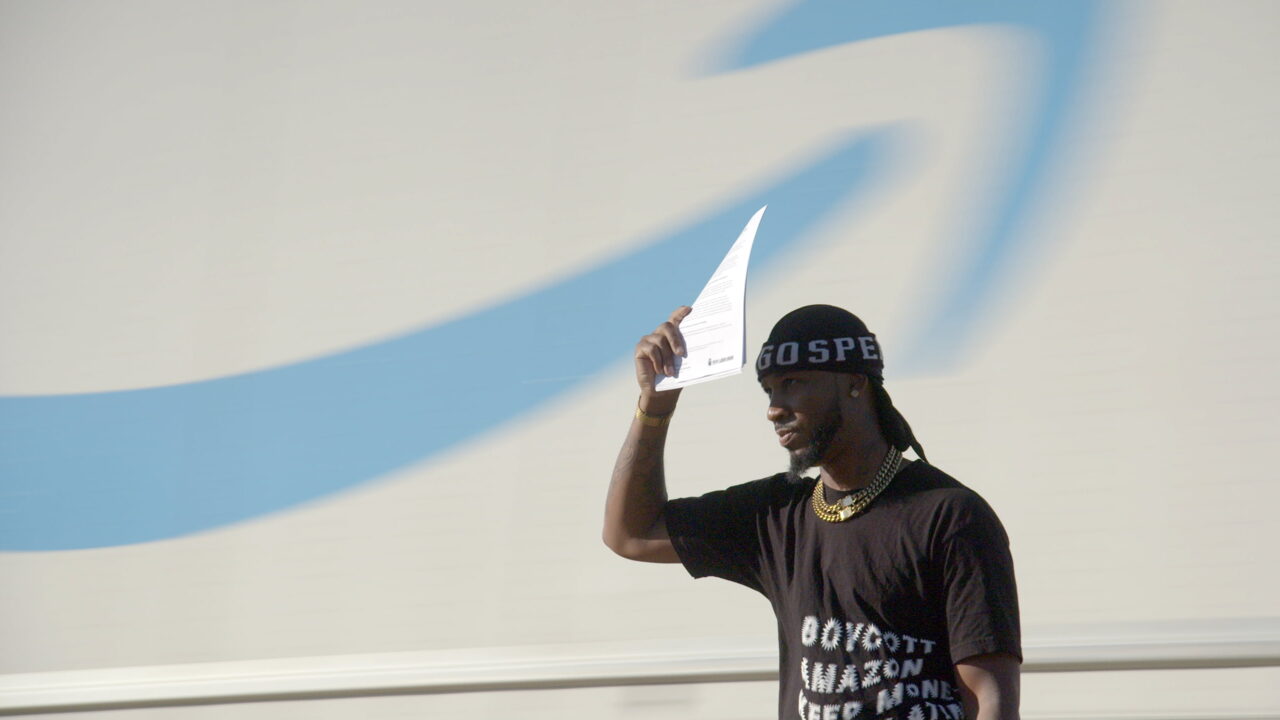 A scene from "Union." (Courtesy of Level Ground Productions)
A scene from "Union." (Courtesy of Level Ground Productions)
“Union” is streaming for a limited time on the film’s website. The crew is donating 50% of rental proceeds to the Amazon Labor Union’s Solidarity Fund.
In the 2 1/2 years since the Amazon Labor Union won its election, Amazon leadership has refused to show up to the negotiating table, ignoring the Dec. 15 deadline issued by the International Brotherhood of Teamsters. In response, on Dec. 19, Amazon warehouse workers in New York, Atlanta and San Francisco declared the “largest ever strike against Amazon.” Wherever this labor battle goes, it is worth remembering how unlikely it all seemed when it started. This is the period covered by the Oscar-shortlisted documentary, “Union,” which tells the story of the union’s first days under the leadership of their president, Chris Smalls. Last week, I caught up with filmmakers Brett Story and Stephen Maing to discuss their film, “hot labor summer” and what Maing predicted will be “a really interesting holiday season, to say the least.” Our conversation has been edited for brevity and clarity.
Truthdig: Stephen, your previous film, “Crime and Punishment,” documented organized resistance among New York Police Department cops. How did that play into making “Union?”
Stephen Maing: “Crime and Punishment” looked at a very different kind of collective movement of active duty, minority whistleblower NYPD cops who were setting out to prove that the department was pressuring, coercing them to police in a discriminatory fashion. What was really startling to me when I learned about the Amazon worker situation and some of the complaints of the early organizers, was that the claims were very similar. They were talking about a culture of fear, a culture of retaliation built around a productivity quota. In the case of the NYPD 12 in “Crime and Punishment,” they were being pressured to produce arrests, summons and stop-and-frisks. The Amazon workers in Staten Island were complaining about productivity quotas in terms of how many packages were being processed.
TD: What about you, Brett? Why did you make this film?
Brett Story: I’m always interested in the question of how people become politicized, and what it means to think of yourself as political. So, the question for me is, Why are so many people seemingly so complacent with the status of things? And all of my work is interested in the question of what politicizes people or brings them into political consciousness.
TD: How does that play into your filmmaking?
BS: Sometimes I try to make films that themselves invite political consciousness, like “The Prison in Twelve Landscapes,” or my first film, “Land of Destiny,” which I thought was going to be about the politicization of a group of workers around an epidemic of cancers in a small town in Canada. There is a desire to bear witness to, and ask questions that bring together the micro and the macro. I think even in the early days of being presented with this idea, when it wasn’t yet a film about the union effort, it really felt like there’s this big question about whether or not we’re in an era in which the working-class identity can even exist as such. When we started seeing this group of people become really active, it was like a new ground for the workplace to be a terrain of struggle for a new generation.
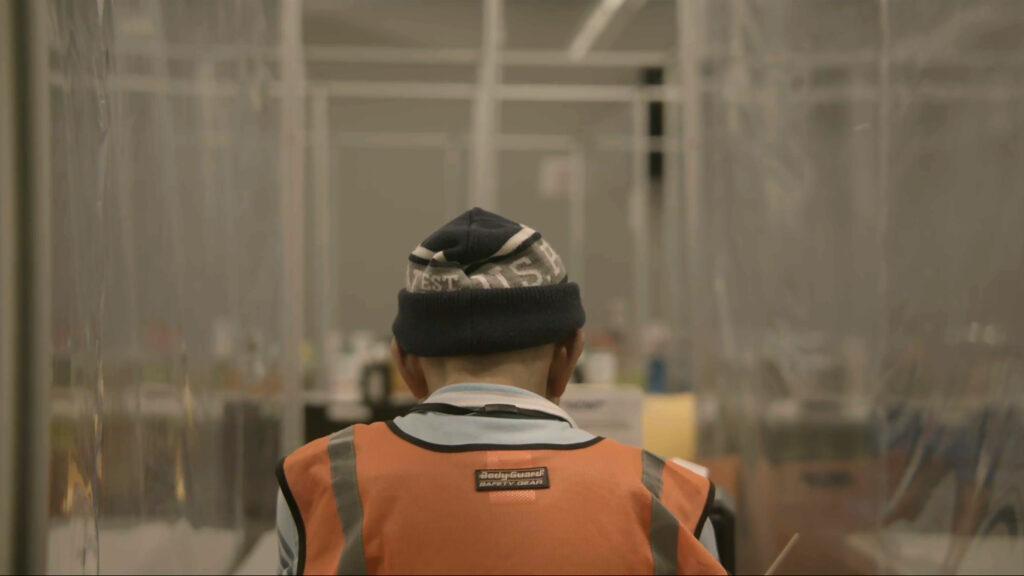
TD: At what point in the organizing did you start filming?
SM: When Chris [Smalls] first organized the walkout around the lack of health and safety protocol during the height of the pandemic, he was called, in a leaked memo by Amazon executives, “not smart or articulate.” And that propelled him to then take the year to draw attention to the kind of business practices that Amazon was employing. It was really a fortuitous series of events that made sure a team was in place for the announcement of Chris and his co-workers starting a unionization campaign one year after the initial walkout. That enabled our team to be able to film from Day One and create this observational account of this historic grassroots movement.
TD: What do you think about the whole “hot labor summer” a few years ago? Was it all a blip?
BS: There’s a lot of evidence that it’s more than a blip. If you put it in the context of a longer durée, we’re still at a low period of union density, of workplace actions, of strikes. Compared to 50 years ago, the numbers are still low, but compared to the last 20 years, they’re high. There’s a spike in the number of new unions being formed, the takeover of existing unions by more radical and reformist contingents, new economic areas that have never seen a lot of action, becoming terrains of labor struggle. I think it’s meaningful empirically even though it’s important to not overstate that workers are now taking over the world.
SM: The media, in some ways, hyped up certain aspects of the story. It was a great headline to run with, but what was troubling was this idea that it assigned this binary of “Can this moment deliver?” Like, will it be a successful or unsuccessful hot labor summer? The framing should have been more about the public coming into consciousness of the workers’ experience. It took a moment like the pandemic to really force people to reckon with this idea that workers across all industries are utterly dehumanized.
TD: How did you see that translated in the Amazon warehouses?
SM: In terms of filmmaking practice for us, we had the opportunity to be on the ground from Day One to witness the process of how being trapped within these contradictions of economic disenfranchisement, political and structural conditions, make people start to feel radicalized. That kind of indignation, of knowing things can’t get any worse, activated all of these workers. People always say, employers are the best organizers. Bad employers politicize the people that need to become political. Though I have filmed collective struggles that involved minority communities, I don’t think I had experienced this level of acute observation of every fleeting conversation having tremendous meaning in the organizing process. It was so much about human beings and relational trust building for the organizers. And then on a daily basis, for us as filmmakers, to continue to earn and renew that trust.
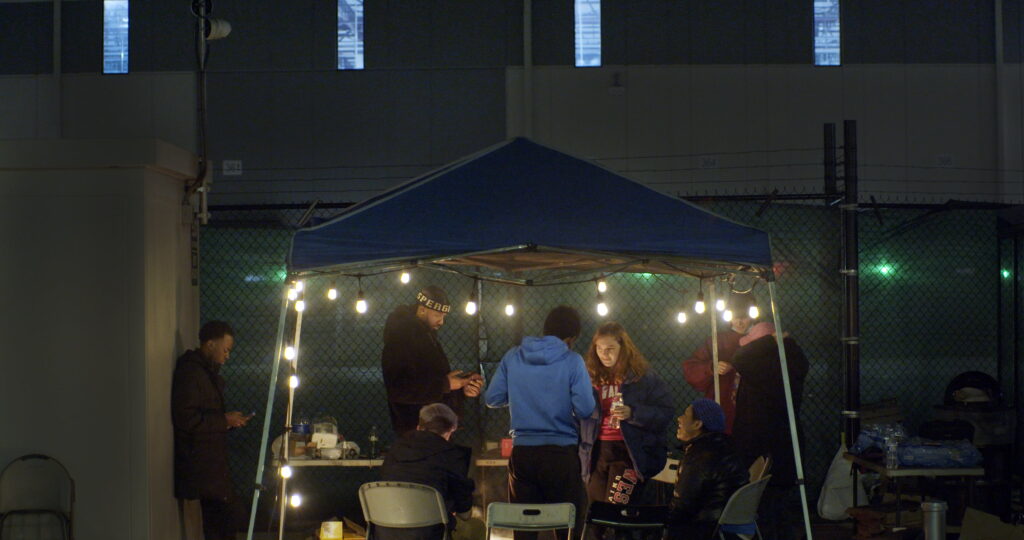
TD: Amazon, famously, is a very opaque organization. Did they interfere with the making of “Union?”
BS: They were pretty hands-off while we were filming. But they were surveilling the ALU, and by virtue of that, surveilling us. They were certainly aware of our film team, but to what degree they were clocking us, or the ALU, as a meaningful threat, was unclear. In the aftermath of the ALU victory, the company filed something like 25 objections and tried to get the victory overturned. And our film team is cited twice within those objections. They were accusing our film team as being kind of a hired propaganda unit of the ALU running interference during election week. And then almost immediately after we premiered our film at Sundance, Amazon filed a set of objections again, citing our film as containing new evidence that proves the ALU victory was illegitimate. But of course, who knows what’s going on behind the scenes, in terms of their capacity to undermine our ability to get distribution.
TD: It’s still strange to me that the film doesn’t have a distributor.
SM: There’s this thing about great, outsized power, right? When I was working in mainland China, there was this idea that the central government’s most effective form of censorship was creating a cultural presence that caused self-censorship. I think there’s a similar sense in that Amazon, in its outsized economic presence in our world, has also captured a tremendous cultural authority. From conversations with friends in the industry, there’s this sense that people did not want to be part of the system challenging Amazon. We don’t want to be too cynical, but we understand everyone is thinking about their livelihood, and at various levels, people live in a state of precarity. I was simultaneously also very shocked that coming out of Sundance, winning an award, then to be invited to 80-100 screenings and festivals and then to be tacitly told that our film may not find a traditional home.
TD: Going back to “Union” being a propaganda film, you actually show the gnarly bits so well, such clear race and class divides. Union members like Natalie Monarrez, for example, have problems with Chris Smalls’ leadership. Why is it important to show that?
BS: I think that that is consistent with our values as filmmakers, at the basic aesthetic and creative level. Both Steve and I and the collaborators that we brought onto this project, are all people that like sophisticated films that appreciate the intelligence of their audiences. We ask them the harder questions that challenge sentimentality. Personally, I think sentimentality in cinema is apolitical and I’d call a hero narrative a sentimental version of a political story; it neuters the so-called hero’s own politics. As filmmakers, we’re always going to try and push against that. And that relates to this commitment to the desire to say something accurate about what we bore witness to. That qualification can coexist with the desire to not harm our protagonists, but also to the movements that we stand in solidarity with.
TD: This could’ve well been the saga of Chris Smalls, right?
BS: From the very beginning, we made a commitment to try and resist the allure of the charismatic leader and hero narrative. For no other reason than that it’s just too easy and a bit too boring. But then in the edit room, when it came down to deciding to include these flaws and frictions, there was a lot of careful thought and deliberation around how we can do this ethically in a way that doesn’t put something out into the cultural zeitgeist that can be weaponized against these people and the movement that we care about.
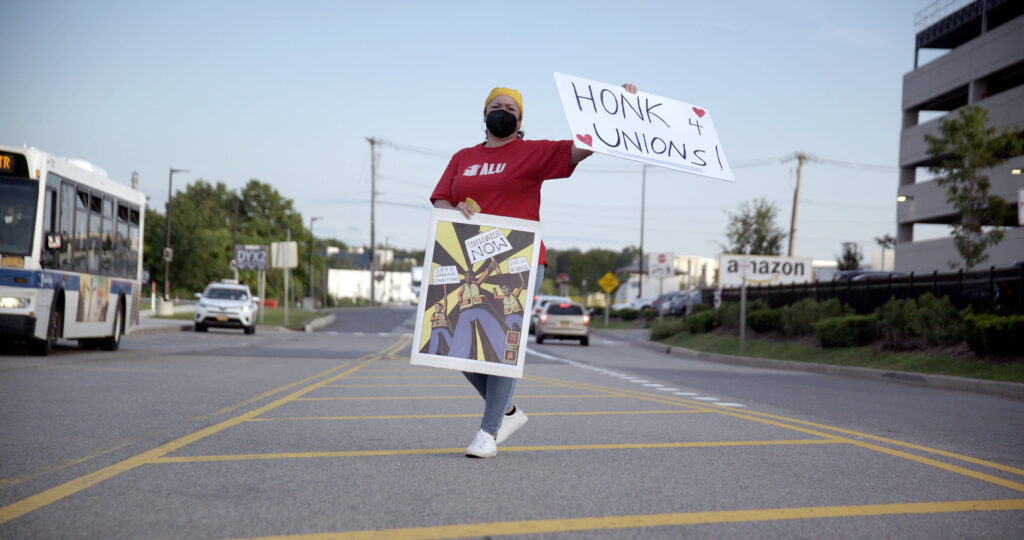
SM: With the time that we spent with the organizers, to present a clean narrative would have totally defied the truth we saw. To show the hard reality and expose the inconvenient truth is to show how difficult organizing is. Aside from taking on a trillion-dollar company, it was clear to us that constructing and structuring a narrative couldn’t be about this binary of winning or losing, but that the journey itself was what people invested themselves in.
BS: It was important for us to be able to state, through the language of cinema, that someone can be flawed and still be worth our respect. We watched lots of things happen, and we never lost respect for Chris or for Natalie, even while they did things that we disagreed with. And I think that that’s really important for us. To try and find a way within the shorthand of cinema so that our audience could relate to the protagonist with a similar complexity.
TD: Amazon is infamous for hiring and firing seasonal workers and you are making the film available for streaming during the holiday season. Amazon workers can watch the film for free. Why focus on this time of the year?
SM: This film is essentially about what has long been coined the “invisible working class,” and we’ve seen a total restructure of the economy through globalization and evolving technology and the increasing intensities of corporate greed. This is a shift in our consciousness as consumers; we’ve been told that we are allowed to want whatever we want, fast and cheap. It is a predatory kind of expectation. All of that burden falls on workers. So, the cheaper and the faster a thing is, the more suffering is immediately translated to workers like those we see in the film. It’s been really heartening to know that Black Friday saw, across Amazon warehouses in 20 countries, strike actions and walkouts. And that there is now this kind of escalation where workers are refusing to acknowledge the inevitable, that they are fed up with being treated like this. We are seeing the public’s consciousness radically shift around their relationship to a corporation like Amazon.
Your support is crucial...As we navigate an uncertain 2025, with a new administration questioning press freedoms, the risks are clear: our ability to report freely is under threat.
Your tax-deductible donation enables us to dig deeper, delivering fearless investigative reporting and analysis that exposes the reality beneath the headlines — without compromise.
Now is the time to take action. Stand with our courageous journalists. Donate today to protect a free press, uphold democracy and uncover the stories that need to be told.

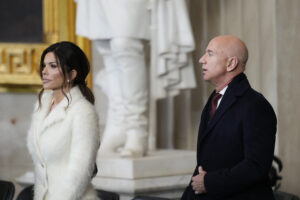
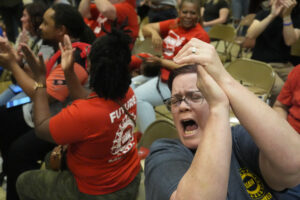


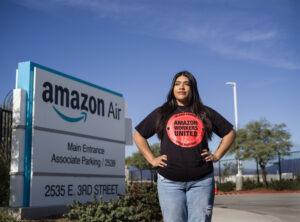
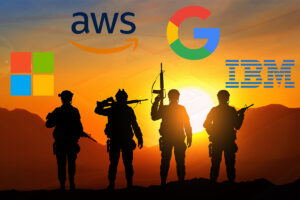
You need to be a supporter to comment.
There are currently no responses to this article.
Be the first to respond.